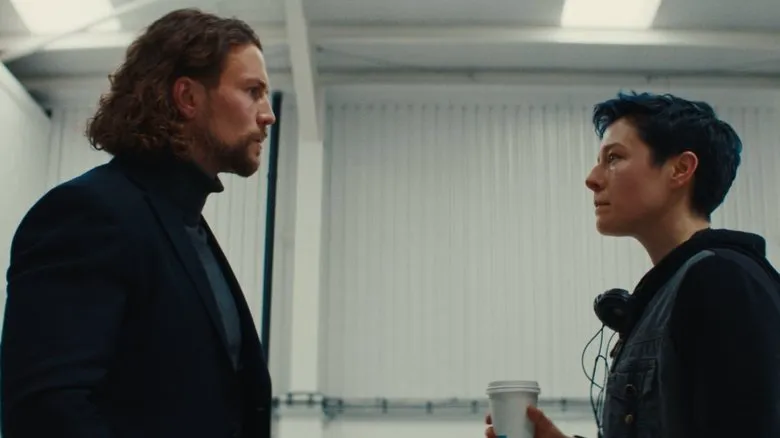Unveiling the Ambition: A Behind-the-Scenes Look at ‘The Talent’ (2013)
The Genesis of a Poignant Comedy
In 2013, Spanish cinema offered a unique blend of satirical humor and profound human observation with Alberto Rodríguez’s The Talent. Co-written with Rafael Cobos, the film delves into the cutthroat world of advertising, set against the seemingly glamorous backdrop of a luxury car commercial shoot. More than just a comedy, The Talent is a sharp exploration of ambition, class divides, and the often-elusive nature of success.
The inspiration for The Talent appears to stem from observations of an industry where appearances often trump substance, and where quiet individual dreams can easily be crushed by the machinery of a grand production. Rodríguez and Cobos skillfully crafted a narrative that, while humorous, retains a deeply poignant core, allowing audiences to connect with the often-overlooked struggles of those behind the scenes.
Casting Contrasts: Antonio de la Torre and Belén Rueda
Central to the film’s emotional resonance are its lead actors. Antonio de la Torre, known for his ability to embody complex characters, perfectly portrays Carlos. As an unassuming, almost invisible assistant, Carlos’s quiet ambition and deep-seated yearning for recognition are palpable. De la Torre masterfully conveys a character who is initially a mere ghost on set, slowly but surely finding his voice and identity.
Opposite him is Belén Rueda as Francesca, the glamorous Italian film star. Rueda brings an compelling duality to Francesca – a public persona of dazzling charisma coupled with a more sensitive, perceptive private self. The chemistry between de la Torre and Rueda is the beating heart of the film. It’s their unexpected connection that drives the narrative forward, transforming what could have been a simple wish-fulfillment fantasy into a nuanced exploration of human bonds. The delicate Dance between Carlos’s vulnerability and Francesca’s understanding is truly captivating to watch.
Setting the Scene: From Rural Spain to High-Stakes Production
The film brilliantly uses its elaborate setting to underscore its thematic concerns. The opening aerial shots of the picturesque Spanish countryside immediately establish a grand scale, contrasting with the intimate story that unfolds. The luxury car commercial itself serves as a perfect microcosm for the film’s dissection of ambition and class – a glossy, high-budget affair where outward appearances are everything, and where anyone not directly in the spotlight can feel entirely insignificant.
The meticulous recreation of a bustling film set provides an authentic backdrop, filled with the specific pressures, hierarchies, and minor dramas that define such productions. It’s a world that highlights Carlos’s initial invisibility, making his eventual moments of recognition all the more impactful.

The Unfolding Drama: Moments of Connection and Cost
The brilliance of The Talent lies in its portrayal of incremental shifts. Carlos doesn’t achieve overnight success through a grand gesture but through small, sincere acts. The pivotal “sunglasses” scene is a microcosm of the entire film: a seemingly mundane task that becomes an opportunity for connection, fueled by Carlos’s quiet determination. It’s from this small opening that a genuine rapport begins to blossom, making Carlos “seen” not just by Francesca, but also by the audience.
In a poignant turn, the film doesn’t offer a clean-cut fairy tale ending. Carlos’s ultimate success, dramatically sealed in a passionate dance, comes with an unexpected cost. The film crew members, his former peers, who once overlooked him, now view him with resentment and alienation. This bittersweet conclusion is a testament to the filmmakers’ refusal to sugarcoat the realities of ambition. It suggests that while achieving one’s dreams is fulfilling, it can also fundamentally alter relationships and lead to a new kind of isolation.

An Enduring Message
The Talent stands as a witty and insightful character study. Through the journey of Carlos and his unlikely bond with Francesca, the film subtly pushes viewers to consider their own definitions of success, the value of authenticity, and the true meaning of being “seen.” It challenges the notion that outward glamour and professional achievement equate to fulfillment, hinting that perhaps the most valuable success is found in genuine human connection, even if fleeting.
Ultimately, The Talent is a testament to the power of a well-crafted story and nuanced performances. It uses the specific world of filmmaking to explore universal themes, leaving audiences with a lingering sense of both the beauty and the complexity of chasing one’s dreams.
